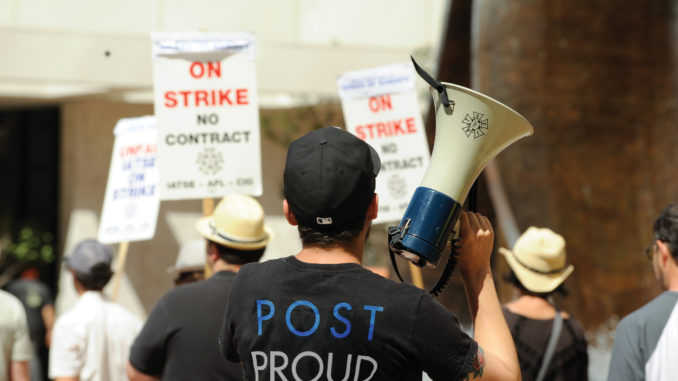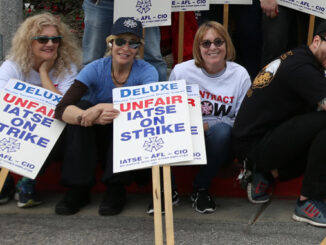
By Rob Callahan

Ordinarily, organizing in unscripted television proceeds on a show-by-show basis. Crews exercise their collective clout to get shows to sign union contracts, and each time they do so they help to build incrementally the foundation for better employment standards in that sector of the industry. But with the newly announced term deal with Fremantle-Media North America, a prolific producer of some of the most prominent titles in reality television, we did not just build a little upon the foundation, we laid a cornerstone.
Anyone who has turned on a TV in the past couple of decades knows that unscripted entertainment abounds. Whether they tune in to workplace documentaries, talent competitions, chronicles of self-improvement, sociological studies or game shows, fascinated viewers of reality TV feel that they are not merely audience members, but witnesses. If our hunger for stories is part of what makes us human, it is a hunger that seemingly cannot be sated by make-believe alone. As much as the human animal might enjoy consuming fictional narratives, we also have a perhaps innate craving to watch real things happening to real people (or at least people who are not professional actors). Unscripted television caters to––and is fueled by––such craving.
But the ascendancy of reality television is not simply a function of its powerful appeal to viewers. Its success is also attributable in part to the fact that it is considerably cheaper to produce than scripted programming. The genre’s inherent qualities account for much of the cost savings; unlike a scripted show, an unscripted program need not employ a cast of professional actors, for instance. To the (limited) extent that unscripted shows record an extant reality instead of fabricating an elaborate alternate reality, they can dispense with many of the expenses that constructing one demands.
While much of the cost savings derives from qualities intrinsic to the genre, a small portion of the genre’s savings derives from a tradition of union avoidance in much of reality TV. Within the world of scripted television, there is a long-standing expectation that a show’s artists and craftspeople will enjoy the benefits of an IATSE contract. But within the realm of reality TV, producers have eschewed the assumption that work will be performed union by default. By operating non-union, many producers avoid paying health and retirement benefits, have employees working gruelingly long hours without overtime, forego holiday and vacation pay, and, for some classifications––like assistant editors, for example––pay people well below a union wage. Over time, these non-union reality producers have effectively undermined any expectation that those who work in the genre can count upon parity in terms and conditions of employment with their peers working in scripted TV.
Previous work stoppages, including the big win at The Biggest Loser, were instrumental in creating the environment in which Fremantle was willing to negotiate.
That is why the deal announced with Fremantle this summer is such a big thing. Fremantle Media North America––a company that produces many of the most successful shows in unscripted television, including the forthcoming X Factor for Fox––has agreed that its current and future shows will employ crews under an IATSE contract. This is great news for the post-production staff that Fremantle employs on its payrolls, who will from now on receive health and retirement benefits. But it is also good news for everyone else working in reality television, because Fremantle is a large enough player that its going union will help to raise the bar for other employers.
A number of Fremantle’s previous shows had been unionized but, in some prominent instances, the company had entered into subcontracting agreements to outsource post-production to a non-union company. So IATSE camera operators shoot American Idol, but the show is cut by editors who do not receive union health and retirement benefits. This summer’s agreement closes the door on any future outsourcing (although it does not affect subcontracts currently in effect); on all of its new shows from this point forward, Fremantle will have the entirety of the shows’ production and post-production work performed with union labor.
Unlike another recent high-profile victory in reality television, the organizing of The Biggest Loser last November, this Fremantle term deal was negotiated without a work stoppage. But previous work stoppages, including the big win at The Biggest Loser, were instrumental in creating the environment in which Fremantle was willing to negotiate. Those who work in reality television have increasingly made it clear that they believe employees on successful unscripted shows should enjoy the same benefits and rights as their counterparts working in scripted TV. All of our previous fights with reality TV producers over the years have brought us to the point where it was possible to close this deal without a contentious confrontation.
By operating non-union, many producers avoid paying health and retirement benefits, have employees working gruelingly long hours without overtime, forego holiday and vacation pay, and, for some classifications––like assistant editors, for example––pay people well below a union wage.
That is not to say that we will not face additional fights in the future to win parity in benefits and terms of employment for those who work in unscripted television. In fact, the Fremantle victory makes it likely that we will see more organizing campaigns in the genre, and many such campaigns will encounter employer opposition. It also means, though, that we will prosecute those campaigns in an environment in which union benefits for reality TV employees are a little less the exception, a little more the norm.
If you work in unscripted TV, you know it takes a special kind of artistry to fashion stories from footage shot without a script. You know, too, that you deserve the safeguards upon your time, the retirement benefits, the health insurance and all the other workplace rights that come with a union contract.
If you are working now on a non-union unscripted show, put in a call to the Guild. You can talk to Preston Johnson (323-978-1084), our organizer in Los Angeles, or Jen Bills (212-302-0700, ext. 206), our newly hired organizer in New York, or me (323-978-1078). We can have a confidential conversation about how you and your colleagues might win a union contract covering your show. We look forward to your call.






